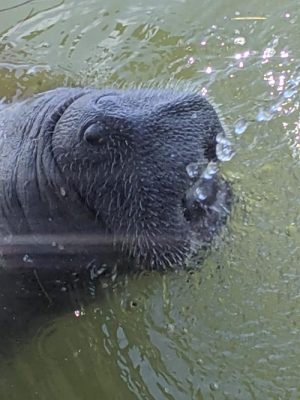
OCEAN CITY — A manatee sighting in the coastal bays near Sunset Marina on Wednesday was not as rare as some might believe for this time of year, but nonetheless the National Aquarium animal rescue team is advising those who spot the far-ranging sea cow to give it plenty of distance and report its location.
On Wednesday evening, a manatee was spotted in the back bays near West Ocean City, and while it is somewhat unusual to see the mammals this far north at this time of year, it certainly isn’t unheard of. The National Aquarium was advised of the manatee sighting and staffers were sent to the area to look for it so far out of its natural range to no avail.
“The National Aquarium was alerted of the sighting, however, our staff was unable to spot the animal in the places that were reported,” an aquarium spokesperson said on Thursday. “We ask the public to please report new sightings to the aquarium’s stranding hotline at 410-576-3880 and stay at least 150 feet away from the animal, including when in boats, paddleboards and kayaks.”
Florida, or West Indian, manatees prefer warmer water temperatures and typically congregate in shallow waters. They cannot survive in water with temperatures below 60 degrees. The coastal areas of Georgia are typically the northernmost range for West Indian manatees because their low metabolic rate does not protect them in cold water. Prolonged exposure to water temperatures below 68 degrees Fahrenheit can result in cold stress syndrome and ultimately death.
Manatees have been seen this far north before although it is somewhat unusual. In July 2015, a manatee was spotted in the area of the Inlet around the Coast Guard station and around the same time another was spotted in the Chesapeake Bay. They have been seen as far north as Cape Cod in 1995 and around New York City and Narragansett Bay in Rhode Island in 2006.
According to a National Aquarium blog entry from last year when a manatee was spotted in the Chesapeake, it is not completely unusual for the sea creatures to be seen this far north.
“West Indian manatees, the species found in North America, primarily live in Florida, but there are regular manatee sightings off the coast of Maryland and the rest of the mid-Atlantic in the summer months, when water in the region is warm enough for these gentle giants,” the report reads. “Manatees travel this far north because they are on the hunt for food. They are herbivores and the submerged aquatic vegetation is ideal for their voracious appetites. They can spend up to seven hours a day snacking on plants and can eat 100 to 200 pounds of food in 24 hours.”
According to Save the Manatee, an organization devoted to protecting the large, slow moving mammals, manatees have no natural predators and it is believed they can live 60 years or more. A certain percentage of manatee mortality is attributed to natural causes such as cold stress from extreme water temperature changes, gastrointestinal disease, pneumonia and other diseases.
Unfortunately, like many other marine species, most manatee mortality is attributed to man-made factors. Most manatee fatalities are the result of collisions with vessels and watercraft. As a result, a large proportion of manatees exhibit spiral propeller scars on their back to the point some are now identified by humans by the distinctive scar patterns on their backs.
Like other marine species, another significant cause of mortality is the ingestion of litter, monofilament lines, fish hooks and tackle and even entanglement in crab trap lines and other gear. According to Save the Manatee, ultimately the loss of habitat is the most serious threat facing manatees in the U.S. at this time. A survey in and around their natural habitat conducted this winter set the current estimated population at 5,733.
The West Indian manatees in the U.S. are protected under federal laws including the Marine Mammal Protection Act of 1972 and the Endangered Species Act of 1973, which make it illegal to harass, hunt, capture or kill any manatee. They are also protected by the Florida Manatee Sanctuary Act of 1978.

